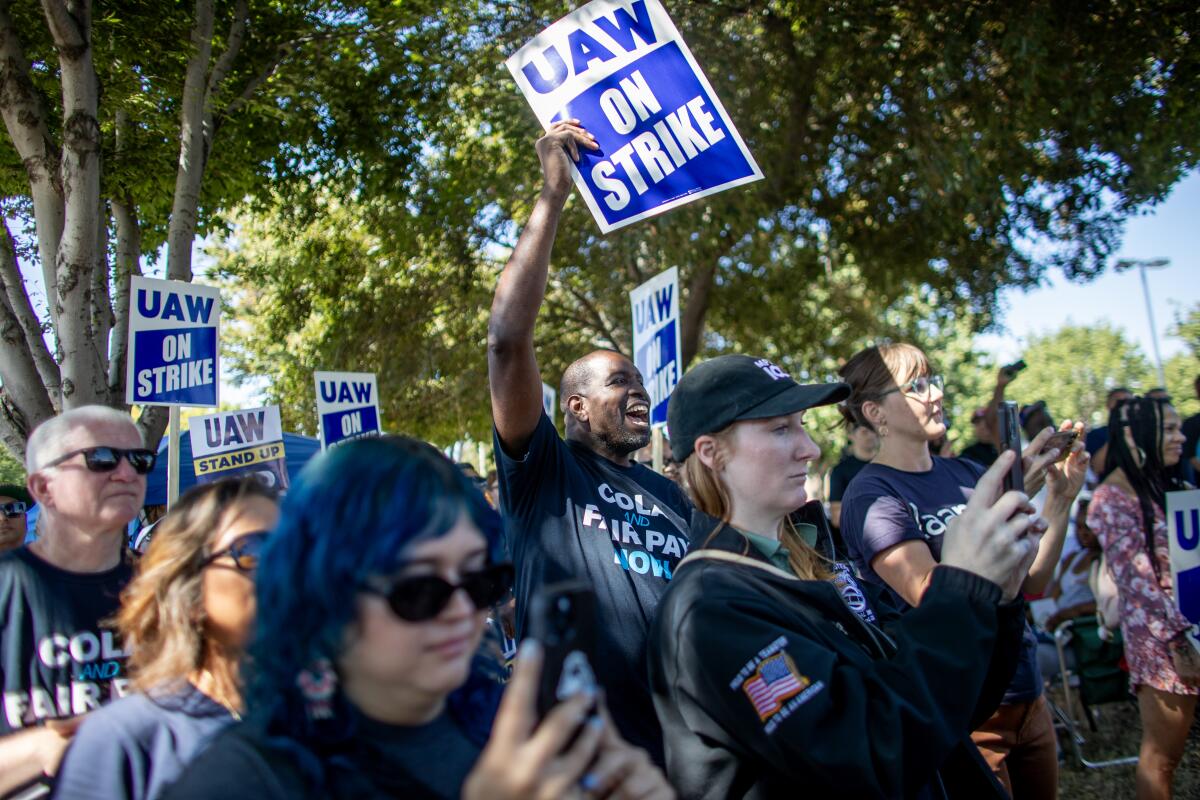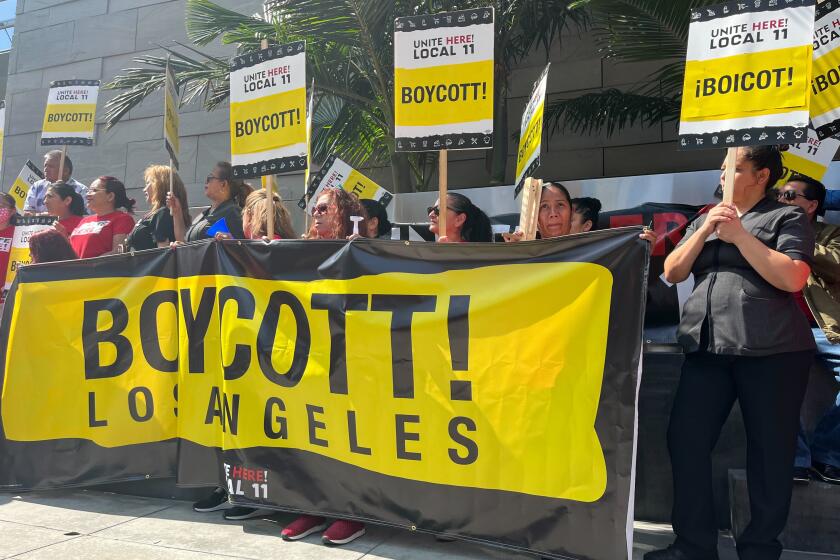UAW aims for drivers’ attention by striking parts warehouses, including two in the Inland Empire

Picketing UAW workers outside an Ontario automotive parts distribution center say jobs that once lifted them into flirting with middle-class status no longer provide them enough for a decent living.
The workers were protesting outside the Stellantis Mopar facility that supplies thousands of parts for automotive repairs and upgrades. It is part of the United Auto Workers’ expansion last week of the strike against Detroit automakers that began Sept. 15.
Similar protests were occurring at 37 other parts distribution centers across the U.S., including a General Motors Co. facility in Rancho Cucamonga.
UAW Local 230 President Jesse Ramirez said that wages for the 138 workers at the warehouse owned by Stellantis — the maker of Chrysler, Jeep, Ram and other nameplates — aren’t keeping pace with inflation. What’s more, a two-tier pay system means newer hires can’t earn more than $25 an hour, far less than what veteran employees make.
“Our senior members receive $31 an hour, but any person hired after 2015 in a parts distribution company can make no more than $25 an hour. They have no pension. They have no medical when they retire,” Ramirez said.
Southern California hotel workers at some 60 properties have been staging intermittent strikes since early July.
“This used to be a job where families worked for generations. We have some members that are third, even fourth generation working for the company. They got to enjoy the fruits of their labor with the company as well as good hard work. That life is not obtainable anymore, especially at $25 an hour,” he said.
President Biden spoke briefly to striking workers at the GM’s Willow Run parts distribution facility in Michigan, urging the strikers to “stick with it because you deserve the significant raise you need and other benefits.”

“UAW, you saved the automobile industry back in 2008 and before. Made a lot of sacrifices. Gave up a lot when the companies were in trouble,” Biden said on CNN. “But now they’re doing incredibly well and guess what? You deserve to do incredibly well too.”
By moving the strike to parts distribution centers, the union is trying to affect dealers’ ability to repair cars, analyst Sam Fiorani told the Detroit News.
“It moves the strike to the consumer,” said Fiorani, vice president of global vehicle forecasting at AutoForecast Solutions. “There have been a lot of parts that have been in short supply before this, and this is just going to exacerbate that problem.”
Union leaders said they didn’t target Ford Motor Co. parts warehouses because of progress made in contract talks.
Outside the Ontario warehouse where he works, Joel Benefield said he is in the lowest-pay tier and is “expected to do more work than others for less money.”
Benefield, 31, is a picker and packer, moving parts from shelves in packets for later shipment. He said overtime has been scarce lately, which is a mixed blessing.
“I had a living wage, but I was working seven days, 82 hours a week. I had no life outside the office. No one should have to work that hard for $1,000 a week,” Benefield said.
Others out on the line were top-tier veterans earning more than $31 an hour. They were picketing to say that higher wages for all should be a priority.
Raul Escudero handles returns at the facility, checking to see whether they can be fixed and sold or should be scrapped. Escudero is at the top tier on the wage scale after 30 years at the facility, making more than $31 an hour.
“The two-tier pay system is unfair for the young guys working here,” the 52-year-old union member said. “When I started here I was able to pay my mortgage. It allowed my wife to stay at home with the kids. Now it’s a struggle to maintain that even at $31 an hour.”
Ramirez said the union gave many concessions to keep the company afloat when it was struggling financially, but the company hasn’t reciprocated and instead removed important income.
“This tier-pay system, the loss of our pensions, the loss of raises during the bankruptcies, the cost of living increases ... all of this was given back by our members when the company was in trouble,” Ramirez said.
“Now it’s their turn to step up,” he said. “All we’re asking for is what’s fairly owed to us. All we’re asking for is for them to give us back what we lost.”
Gulf War Army veteran Michael Carter said that when he started working at the Ontario facility 29 years ago, “I came home from Desert Storm. I didn’t have a job and I had no direction. This company hired me. I was making almost $16 an hour and that was pretty good then. Now, I’m making $30. A $15 increase in 29 years just isn’t good.”
For the younger workers it is much worse, Carter, 56, said. “And they keep taking things from us. They took away our pensions. They took away some of our five-minute breaks. They took away our bonus checks. They have never given any of that back. Now, we don’t even have cost of living increases. This has to change.”
Striking Ontario worker Mark Fernandez, 51, said the walkout is hard on union members but worth the risk.
“I don’t want to be on strike,” Fernandez said. “I’m losing half of my pay right now. I’m getting some money from the strike relief fund. But I’m out here because we have lost so much. If we don’t win, I’ll be out looking for a second job.”
The Detroit News via Tribune News Service contributed to this report.
More to Read
Inside the business of entertainment
The Wide Shot brings you news, analysis and insights on everything from streaming wars to production — and what it all means for the future.
You may occasionally receive promotional content from the Los Angeles Times.












